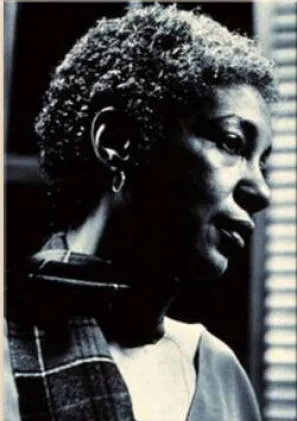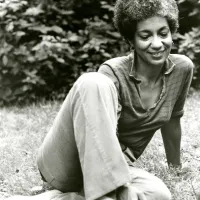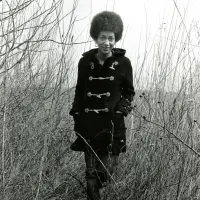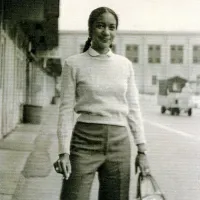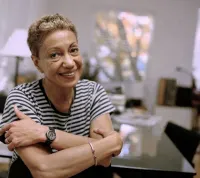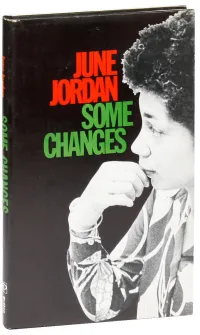Biography
1936 - 2002
“Bisexuality means I am free and I am as likely to want to love a woman as I am likely to love a man, and what about that? Isn’t that what freedom implies?”
- June Jordan
Born in Harlem in 1936 to Jamaican immigrant parents, June Jordan was raised in Brooklyn. Earning her B.A. from Barnard College in 1953, she was married in 1955 and divorced a decade later. In 1967 she began her academic career, teaching at several universities before becoming a tenured professor of English at State University of New York at Stony Brook where she directed the Poetry Center. In academia, Jordan fought for the inclusion of Black Studies in the curricula. A key member of the Black Arts Movement of the 1960s and 1970s, Jordan was coming of age as a poet when the voices of black female writers were just beginning to be heard. She was the author or editor of 28 books which, in addition to poetry, included essays as well as children’s titles. Jordan was also the author of several plays and musicals, a lyricist, and wrote the librettos for two operas. Her journalism touched strongly on feminism, racism, and politics. She was a regular columnist for ‘The Progressive.’ Along with R. Buckminster Fuller, Jordan even created a plan for the redesign of Harlem. In 1988 she was appointed professor of African-American Studies at the University of California, Berkeley where she founded Poetry for the People, a program to train undergrads to take poetry to community groups as a form of political empowerment. Jordan was the recipient of numerous honors and awards including a Rockefeller grant, a Yaddo residency, a Prix de Rome in Environmental Design, an NEA fellowship, and the Achievement Award for International Reporting from the National Association of Black Journalists. After struggling with breast cancer for a decade, she died from the disease in 2002 at the age of 65.
1936 - 2002
“Bisexuality means I am free and I am as likely to want to love a woman as I am likely to love a man, and what about that? Isn’t that what freedom implies?”
- June Jordan
Born in Harlem in 1936 to Jamaican immigrant parents, June Jordan was raised in Brooklyn. Earning her B.A. from Barnard College in 1953, she was married in 1955 and divorced a decade later. In 1967 she began her academic career, teaching at several universities before becoming a tenured professor of English at State University of New York at Stony Brook where she directed the Poetry Center. In academia, Jordan fought for the inclusion of Black Studies in the curricula. A key member of the Black Arts Movement of the 1960s and 1970s, Jordan was coming of age as a poet when the voices of black female writers were just beginning to be heard. She was the author or editor of 28 books which, in addition to poetry, included essays as well as children’s titles. Jordan was also the author of several plays and musicals, a lyricist, and wrote the librettos for two operas. Her journalism touched strongly on feminism, racism, and politics. She was a regular columnist for ‘The Progressive.’ Along with R. Buckminster Fuller, Jordan even created a plan for the redesign of Harlem. In 1988 she was appointed professor of African-American Studies at the University of California, Berkeley where she founded Poetry for the People, a program to train undergrads to take poetry to community groups as a form of political empowerment. Jordan was the recipient of numerous honors and awards including a Rockefeller grant, a Yaddo residency, a Prix de Rome in Environmental Design, an NEA fellowship, and the Achievement Award for International Reporting from the National Association of Black Journalists. After struggling with breast cancer for a decade, she died from the disease in 2002 at the age of 65.
Demography
Demography
Gender Female
Sexual Orientation Bisexual
Gender Identity Cisgender
Ethnicity Black
Nations Affiliated United States Bahamas
Era/Epoch Civil Rights Movement (1954-1968) Information Age (1970-present) Post-Stonewall Era (1974-1980)
Field(s) of Contribution
Academics
Author
Editor
Journalism
Music
Poet
Social Justice
Theater
Commemorations & Honors
Rockefeller Grant for Creative Writing (1969-1970)
Yaddo Fellowship Recipient (1979)
National Endowment for the Arts Fellowship (1982)
National Association of Black Journalists Achievement Award for International Reporting (1984)
Chancellor's Distinguished Lectureship from UC Berkeley Recipient (1991)
PEN Center USA West Freedom to Write Award (1991)
The Woman's Foundation Ground Breakers-Dream Makers Award Winner (1994)
Lila Wallace Reader's Digest Writers Award Winner (1995-1998)
Posthumous Lambda Literary Award for Poetry (2005)
National LGBTQ Wall of Honor at the Stonewall National Monument Inductee (2019)
Demography
Gender Female
Sexual Orientation Bisexual
Gender Identity Cisgender
Ethnicity Black
Nations Affiliated United States Bahamas
Era/Epoch Civil Rights Movement (1954-1968) Information Age (1970-present) Post-Stonewall Era (1974-1980)
Field(s) of Contribution
Academics
Author
Editor
Journalism
Music
Poet
Social Justice
Theater
Commemorations & Honors
Rockefeller Grant for Creative Writing (1969-1970)
Yaddo Fellowship Recipient (1979)
National Endowment for the Arts Fellowship (1982)
National Association of Black Journalists Achievement Award for International Reporting (1984)
Chancellor's Distinguished Lectureship from UC Berkeley Recipient (1991)
PEN Center USA West Freedom to Write Award (1991)
The Woman's Foundation Ground Breakers-Dream Makers Award Winner (1994)
Lila Wallace Reader's Digest Writers Award Winner (1995-1998)
Posthumous Lambda Literary Award for Poetry (2005)
National LGBTQ Wall of Honor at the Stonewall National Monument Inductee (2019)
Resources
Resources
Erickson, Peter. "The Love Poetry of June Jordan." Callaloo 9 (1986): 221-234.
Erickson, Peter. "State of the Union." Transition 59 (1992): 104-109.
Harjo, Joy. "An Interview with June Jordan." High Plains Literary Review 3 (1988): 60-76.
Parmar, Prathiba. "Black Feminism: the Politics of Articulation." Identity: Community, Culture, Difference. Jonathan Rutherford, ed. London: Lawrence & Wishart, 1990. 101-127.
http://en.wikipedia.org/wiki/June_Jordan
http://www.poetryfoundation.org/bio/june-jordan
http://bancroft.berkeley.edu/collections/gaybears/jordan/
http://www.huffingtonpost.com/faith-cheltenham/black-bisexuality_b_2735891.html
http://affinitymagazine.us/2017/02/20/june-jordan-black-bisexual-icon/
Resources
Erickson, Peter. "The Love Poetry of June Jordan." Callaloo 9 (1986): 221-234.
Erickson, Peter. "State of the Union." Transition 59 (1992): 104-109.
Harjo, Joy. "An Interview with June Jordan." High Plains Literary Review 3 (1988): 60-76.
Parmar, Prathiba. "Black Feminism: the Politics of Articulation." Identity: Community, Culture, Difference. Jonathan Rutherford, ed. London: Lawrence & Wishart, 1990. 101-127.
http://en.wikipedia.org/wiki/June_Jordan
http://www.poetryfoundation.org/bio/june-jordan
http://bancroft.berkeley.edu/collections/gaybears/jordan/
http://www.huffingtonpost.com/faith-cheltenham/black-bisexuality_b_2735891.html
http://affinitymagazine.us/2017/02/20/june-jordan-black-bisexual-icon/
